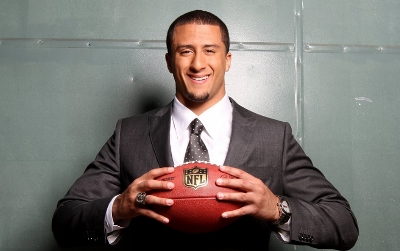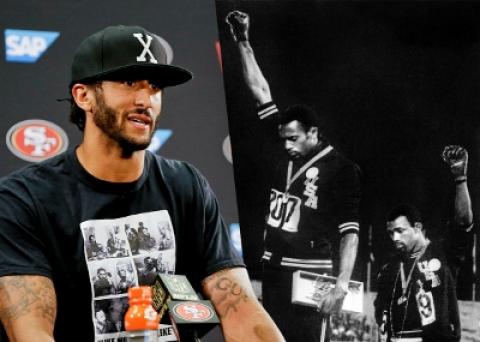Colin Kaepernick’s Protest is Part of a Patriotic Tradition; Protesters Plan to Block Traffic Outside Rams Opener
- Colin Kaepernick’s Protest is Part of a Patriotic Tradition - Jesse Jackson (Chicago Sun-Times)
- Kaepernick Protesters Plan to Block Traffic Outside Rams Opener - Dennis Romero (L.A. Weekly)
by Jesse Jackson; Dennis Romero
August 28, 2017
Colin Kaepernick, the former quarterback of the San Francisco 49ers, is being blackballed — itself a revealing phrase — from the National Football League with the collusion of the all-white owners. He is ostracized because a year ago he exercised his First Amendment right to free speech by taking a knee during the playing of the national anthem.
Kaepernick isn’t hooked on drugs. He isn’t a felon. He hasn’t brutalized women. He is treated as a pariah because he protested the continued oppression “of black people and people of color.” He wanted, he said, to make people “realize what’s going on in this country. … There are a lot of things going on that are unjust, people aren’t being held accountable for, and that’s something that needs to change.” Born in Milwaukee, Wis., one of the most racially segregated cities in America, Kaepernick is particularly concerned about police brutality and the shocking police shootings of unarmed African Americans.
Surely his cause is just. Tens of thousands have joined peaceful demonstrations against police brutality in cities across the country. That movement, led by Black Lives Matter, put the issue of our institutionalized criminal injustice system back on the national agenda. Under President Barack Obama, the Justice Department reached agreements with dozens of police departments to change police training and tactics. There was bipartisan agreement to change racially discriminatory sentencing practices.
Kaepernick’s protest was nonviolent and dignified. The San Francisco 49ers, the NFL and President Obama all agreed that it was a protected act of free speech.
Yet the owners of the NFL and their front offices have ostracized Kaepernick. No follower of the sport would question his skill level. There are 64 quarterbacks on NFL teams, many of whom can’t hold a candle to Kaepernick. He’s ranked as the 17th best quarterback in the league. When he came back from injury last year, he started the last 11 games, racking up a 90.7 QB rating, with 16 touchdowns running and passing and only four interceptions, while playing on a team sorely lacking in talent. That rating was better than stars like Cam Newton, Philip Rivers and Eli Manning, among others.
Sports writers report that Kaepernick is loathed by the white owners and front offices, some of whom denounce him as unpatriotic. But what Kaepernick did — a dignified, nonviolent protest to raise awareness of a true and just cause — is the height of patriotism. It is the essence of democratic citizenship.
Others claim Kaepernick is excluded because he would be divisive, and teams have to be run with military discipline. But, our military has learned to succeed with people of all races, genders, sexual preferences and political perspectives. Almost 70 percent of the players on NFL teams are African American. For most of them, Kaepernick’s protests are not as divisive as Tom Brady’s open support of Donald Trump. Last year, Kaepernick’s teammates voted to give him the annual award for “inspirational and courageous play.”
No, Kaepernick is being treated as a pariah by the private club of white owners who are terrified of controversy. They clean up big time from public subsidies — tax breaks, public contributions to stadiums, television contracts — and they tremble at anything that might disrupt the gravy train. They want to make an example of Kaepernick as a way of teaching the rest of the players a lesson, hoping to keep plantation-like control of their players.
Kaepernick stands in a proud history of African-American athletes who have used their prominence to protest racism at home and unjust wars abroad. They have chosen to speak out at the height of their powers and in their prime money-making years. Often they have paid a high price personally, in their careers, their finances, their stature. And yet in the end, their sacrifice helped make this country better.
Muhammad Ali opposed the Vietnam War and was prosecuted for refusing to be inducted into the armed forces, stripped of his title and barred from fighting. He lost some of the best years of his boxing life, but his protest helped build the antiwar movement that eventually brought that tragic and misbegotten war to an end.
Curt Flood, an all-star centerfielder for the St. Louis Cardinals, refused to be bought and sold “like a slave.” His protest and litigation cost him much of his career, but it broke open the owners’ control of players, opened the way to free agency and transformed baseball.
Jackie Robinson broke open the racial barrier in baseball. He endured seasons of racial insult, on and off the field. His remarkable skill and character transformed baseball, and helped spur the civil rights movement. He joined Dr. King in the demonstrations for civil rights. In his autobiography, “I Never Had It Made,” published just before his death, he related his own feelings about the national anthem, as it played at the beginning of his first World Series game:
“There I was, the black grandson of a slave, the son of a black sharecropper … a symbolic hero to my people. … The band struck up the National Anthem. The flag billowed in the wind. It should have been a glorious moment for me as the stirring words of the National Anthem poured from the stands. Perhaps, it was, but then again….
“As I write this 20 years later, I cannot stand and sing the anthem. I cannot salute the flag; I know that I am a black man in a white world. In 1972, in 1947, at my birth in 1919, I know that I never had it made.”
Colin Kaepernick stands in a proud tradition. For choosing to speak out, he has been shut out. The collusion of the owners not only violates antitrust laws; it tramples basic constitutional protections. The NFL owners should be called to account, not Kaepernick.
[Jesse Jackson is the founder of Rainbow/PUSH.]
By Dennis Romero
September 7, 2017

Colin Kaepernick is inspiring a discussion about race and the NFL in Los Angeles.
credit: San Francisco 49ers/NFL Weekly
Colin Kaepernick is the former San Francisco 49ers quarterback who last year took a knee during the national anthem as a symbol of protest against police shootings of unarmed African-American men.
Now demonstrators plan to take a knee in the street to block traffic outside Los Angeles Memorial Coliseum as the Rams gear up for their season opener Sunday against the Indianapolis Colts. Protest leader Najee Ali, head of the local chapter of Rev. Al Sharpton's National Action Network, describes the planned action as "civil disobedience" in defiance of a league that many believe is blacklisting a still-unsigned Kaepernick for his stance.
"We plan on impeding traffic and the fans' ability to watch the game on time," he says. "Without question, there's no way we can allow the Rams and the NFL to carry on as if this is business as usual. They've shown no concern about the killings of people of color nationwide by police."
As calls for the NFL to find a job for Kaepernick have grown louder during the preseason, the league has generally remained silent, and representatives have not responded to our past requests for comment. However, after Seattle Seahawks defensive end Michael Bennett recently accused Las Vegas cops of racial profiling during an incident captured on video last month, NFL commissioner Roger Goodell yesterday released a statement.
"We support Michael and all NFL players in promoting mutual respect between law enforcement and the communities they loyally serve and fair and equal treatment under the law," he said.
Meanwhile, with the preseason over, Kaepernick backers have lost hope that he'll be signed this year. But they say the lack of a job for the player will only solidify ongoing protests against the league. Ali and the local National Action Network instituted a boycott of Rams and Chargers games. And now some civil rights leaders are putting a spotlight on front-office diversity hiring, or lack thereof.
"Kaepernick is the one who tried to shine a light on our people being slaughtered in the streets unjustly and he's
being punished," Ali says. "We're willing to fight this fight all the way."
Demonstrators, including members of Project Islamic Hope, the Southern Christian Leadership Conference and the L.A. Urban Policy Roundtable, are also requesting a meeting with Rams owner Stan Kroenke "to discuss his commitment to African-American and Latino social issues," according to a statement.
We reached out to multiple Los Angeles Police Department officials, none of whom was aware of the planned, 11 a.m.-to-noon demonstration at 39th and Figueroa streets outside the main parking entrance to the Coliseum. Ali said he plans to meet with officers tomorrow to explain that demonstrators will not resist arrest.
"We just want to practice our First Amendment rights peacefully, in a nonviolent fashion — in a manner that Kaepernick did," he says. "I'm willing to be arrested."
[L.A. Weekly staff writer Dennis Romero has worked on staff at several magazines and newspapers, including the Philadelphia Inquirer and the Los Angeles Times, where he participated in Pulitzer Prize-winning coverage of the L.A. riots. His work has appeared in Rolling Stone online, the Guardian, and, as a young stringer, the New York Times.]


Spread the word